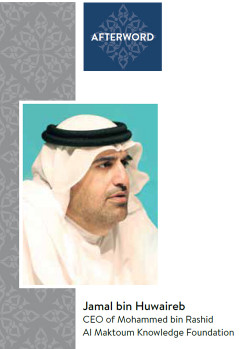Literacy Challenge... The Noble Goal
“Man has two choices as he looks ahead: either be a follower or be proactive.
For us, we want to be proactive and advanced.”
His Highness Mohammed bin Rashid Al Maktoum, Vice President and Prime
Minister of the United Arab Emirates and ruler of Dubai
History teaches us that man cannot advance without learning and knowledge and that nations who disparage and disregard the pursuit of knowledge are doomed to an unfortunate fate. Thus, facilitating knowledge is a noble and sublime goal to be celebrated and invested in deeply. I believe that literacy is one of noblest goals of all and that science and knowledge hold the key to new worlds, while the ‘ignorant’ man becomes a burden on himself-and eventually on his nation.
Hence, ahead of the fourth edition of The Knowledge Summit in 2017, it seemed timely to highlight the great value of The Literacy Challenge Project, an initiative of His Highness Mohammed bin Rashid Al Maktoum, Vice President and Prime Minister of the United Arab Emirates, and ruler of Dubai, may God bless him. The goal of this initiative is to eradicate illiteracy among 30 million Arab youth and children by 2030. The Project is spearheaded by the Mohammed bin Rashid Al Maktoum Knowledge Foundation, in cooperation with UNESCO and the United Nations Development Program.
As we approach the third decade of the 21st century, we cannot accept the continued proliferation of illiteracy among our youth. Modern life requires basic knowledge not only of the alphabet, but also of technical and scientific matters so that one can prosper in life, while also contributing to one’s community and country. This is what motivates nations to work hard on literacy. UNESCO laid down an important marker in 1966 by dedicating September 8 as International Literacy Day. By making this an annual event to be celebrated, UNESCO underscored for states and governments the need to work hard to pursue this noble goal and to dedicate all the resources necessary to achieve it.
In fact, many countries have had astonishing success in this regard. In South Korea, for instance, the illiteracy rate stood at 86 percent in 1961 but after the leadership enshrined literacy as a national goal, they managed to lower the illiteracy rate to just 1 percent only by 2006.
The United Kingdom declared as far back as 1936-83 years ago-that it had eradicated illiteracy countrywide. This is not surprising since the British led the world in science from the eighteenth century, and forged some amazing leaps in industry, trade, and inventions, despite perpetrating some injustices with many states and peoples along the way. In our Arab world, we still suffer from alarmingly high levels of illiteracy. In 2014 there were 96 million illiterate people, or 19 percent of the population. In this era of the ubiquitous Internet and social media apps like Facebook, WhatsApp, and Instagram, this is a scary figure indeed.
Inevitably, eradicating illiteracy has become an absolute necessity to keep apace in the modern era. His Highness Mohammed bin Rashid Al Maktoum was absolutely right when he said: “Man has two choices as he looks ahead: either be a follower or be proactive. For us, we want to be proactive and advanced.” There is no way to be proactive and advanced without learning and knowledge.








